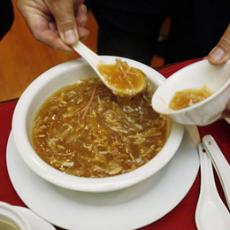
CHRISTOPHER CRUISE: This is SCIENCE IN THE NEWS in VOA Special English. I'm Christopher Cruise.
FAITH LAPIDUS: And I'm Faith Lapidus. This week, we tell about sharks. We tell how demand for shark fin soup has led to the killing of millions of these creatures. And we tell about tests on pieces of bone said to be from pilot Amelia Earhart.
CHRISTOPHER CRUISE: A picture in the newspaper shows a person standing next to a huge shark. The body of the shark is hanging with its head down. The words below the picture say the shark was a very big one. Or perhaps it was one of the biggest ever caught in the area. The person who brought in the shark is smiling. That person won a battle with what has been called one of nature's fiercest creatures.
FAITH LAPIDUS: Some people, however, do not approve of catching sharks. They do not think all sharks are terrifying enemies. They know that studies show lightning and snakebites hurt more people than do shark attacks. Sharks kill about ten people a year. Yet people kill tens of millions of sharks a year.
Activists for sharks note that sharks are valuable in the ocean. They eat injured and diseased fish. Their hunting means other fish do not become too great in number. This protects other creatures and plants in the ocean.
CHRISTOPHER CRUISE: Wildlife activists worry that some kinds of sharks are in danger of disappearing. The National Oceanic and Atmospheric Administration estimates fishing operations kill more than 100 million sharks every year.
Sharks are harvested for meat and cartilage, liver oil and, especially, for their fins. And many sharks die when fishermen harvesting other kinds of fish pull in sharks by accident. Sharks are vulnerable to over-fishing. Sharks grow and develop slowly and do not produce many young.
FAITH LAPIDUS: George Burgess leads the International Shark Attack File at the Florida Museum of Natural History at the University of Florida in Gainesville. He says shark attacks increased during the past century for a good reason: hundreds of millions of people now use the world's oceans.
The International Shark Attack File says the number of shark attacks rose 25 percent last year. Seventy-nine shark attacks were reported in 2010. Six people were killed. The File gives likely reasons for the increase, including higher water temperatures because of unusually warm weather. There were 36 shark attacks in the United States -- the most of any country.
CHRISTOPHER CRUISE: The International Shark Attack File describes shark attacks as either provoked or unprovoked. An unprovoked attack means the person is alive when bitten. It also means the person must not have interfered with the shark.
But some divers interfere with sharks on purpose. They want to get the attention of sharks, perhaps to take pictures of them. The diver may put food in the water to get the animal to come close. Sharks do not normally want to be with people. But their excellent sense of smell leads them to food.
Some experienced divers say they may not face danger when near a shark. But they say the next person who comes near the shark may be in trouble. The animal's experience with being fed may make it connect food with people.
(MUSIC)
FAITH LAPIDUS: Some divers and filmmakers enter a shark's territory while inside containers made of steel. Others wear heavy metal equipment for protection. And others get near sharks wearing only normal diving equipment.
This close contact with sharks has its critics. Some people say it is an invasion of the animals' territory for no good reason. The contact can produce exciting films that may increase public interest and sympathy for sharks. But they may also make us more afraid of them.

CHRISTOPHER CRUISE: Today, a major threat to sharks comes from shark fin soup. This food has increased in popularity over the years. Fisheries can earn a lot of money for even one kilogram of shark fins.
"Finning," as it is called, is big business. Fishers cut off the shark's fin while the shark is still alive and throw the animal back into the water. The shark is unable to swim or eat. In hours or days, it bleeds to death on the bottom of the ocean.
Wildlife protection groups and many people worldwide have denounced finning as torture. Some areas have banned this activity. But it is hard to enforce the ban in many places.
FAITH LAPIDUS: Many people want to save sharks and stop finning. One of them is John McCosker. He is the head of the aquatic biology department at the California Academy of Sciences. Professor McCosker has been studying sharks for more than 30 years. He says finning is not only cruel, but bad for the oceans.
JOHN MCCOSKER: "We must stop the shark-finning which is resulting in the death of 30 to 70 million sharks each year because that has so upset ocean ecology by the removal of these often apex, top-level predators."
FAITH LAPIDUS: Professor McCosker says demand for shark fin soup is strong in China.
John McCosker: "It is a cultural tradition, and not all Asian cultures believe in it. But what it now is, is a demonstration really of wealth and status. Shark fin soup is usually served at weddings and at banquets, and it's very expensive."
CHRISTOPHER CRUISE: The European Union, the nation of Guam and some individual American states want to stop finning. In January, President Obama signed a measure known as the Shark Conservation Act. The measure strengthens American laws against finning. It requires the fishing industry to bring sharks to port before their fins are cut.
Fishers can make a lot of money by selling shark fins. Professor McCosker believes the best way to stop finning is to educate owners of Chinese restaurants not to sell shark fin soup. He also wants to persuade people not to buy it.
FAITH LAPIDUS: State lawmakers in California are considering a bill that would make it illegal for people to have, sell or distribute shark fins. Supporters say the bill will help protect sharks. But opponents have described the measure as an attack on Chinese culture.
State Senator Leland Yee and Chinese restaurant owners say they are concerned about the overfishing of sharks. In fact, they want a federal law to ban the practice of finning. But Senator Lee says not all sharks are in danger of extinction. He says the proposed law to ban the eating of shark fins is an unfair attack on Asian culture and cuisine.
(MUSIC)
CHRISTOPHER CRUISE: The mystery of what happened to Amelia Earhart will go on. Earhart disappeared more than 70 years ago while attempting to fly around the world. Experts at the University of Oklahoma say they could not link a small piece of bone to the famous pilot. But they also say they will continue tests on a piece of soil or human waste.
The International Group for Historic Aircraft Recovery had asked the university to study the material. The group found it on an archeological dig on Nikumaroro, an island in the southwestern Pacific Ocean.
Nikumaroro was once called Gardner Island. It could have been on Earhart's way to Howland Island. She and her navigator, Fred Noonan, were hoping to reach Howland to get more fuel for their airplane.

FAITH LAPIDUS: Historical records say Earhart died on July 2nd, 1937, when her plane fell into the ocean after all its fuel was gone. But the International Group for Historic Aircraft Recovery disputes the official version of events. It suspects that she and Noonan found their way to Nikumaroro Island.
Members have repeatedly explored there over the years. They have found a number of objects that might be connected to Earhart. But a link between those objects and her or Noonan has yet to be firmly established.
CHRISTOPHER CRUISE: Members recently found what could be a piece of human finger bone and the possible human waste. First tests of the bone fragment showed that human genetic material, human DNA, was present. But later tests could not repeat the results.
Scientist Cecil Lewis said the human DNA could have been there because people had had contact with the bone. Or, he said human DNA really was present in the bone, but the bone was too small or low-quality to repeat the first results. Or, the DNA in the bone might be non-human.
FAITH LAPIDUS: The test results of the piece of soil or waste material were more promising. These results showed human DNA.
Mr. Lewis said his team is using a genetic method to examine bacteria species inside the material. He said the presence of some plant and animal DNA would be a further sign that the piece is waste material. That material could contain information about what the individual was eating and his or her health.
(MUSIC)
FAITH LAPIDUS: This SCIENCE IN THE NEWS was written by Christopher Cruise and Jerilyn Watson. June Simms was our producer. I'm Faith Lapidus.
CHRISTOPHER CRUISE: And I'm Christopher Cruise. Listen again next week for more news about science in Special English on the Voice of America.
cartilage: the strong white flexible substance found between the joints in the body; a piece of this 軟骨組織;(一塊)軟骨
Shark diving and feeding raises concerns
Sharks: A bad image, but oceans value them
Research Shows How Fishing for Sharks Also Affects Other Sea Animals
(來源:VOA 編輯:崔旭燕)
